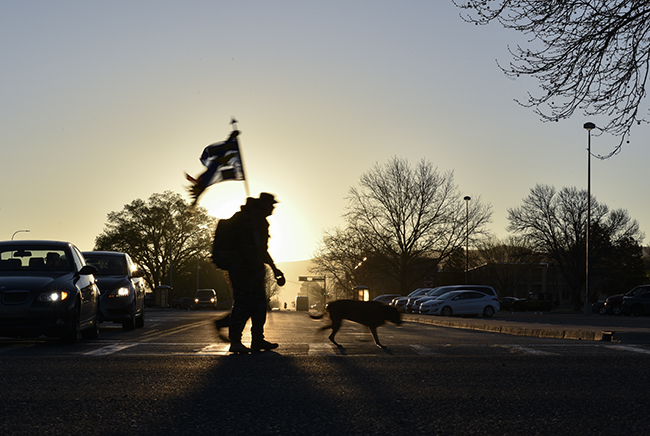
Participants take part in the 2019 377th Security Forces Squadron Suicide Awareness Ruck March at Kirtland AFB, N.M., on March 29, 2019. Air Force photo by A1C Austin J. Prisbrey.
This story was updated on Aug. 1, 2019, at 1:04 p.m. EST.
Air Force units will stand down for one day this summer to address the rising problem of suicides, which Air Force Chief of Staff Gen. David Goldfein said is “an adversary that is killing more of our airmen than any enemy on the planet.”
As of the end of July, 79 suicides had occurred in the Air Force in 2019 —nearly as many as were recorded last year in about half the time. The service saw about 100 suicides per year in each of the last five years.
Chief Master Sergeant of the Air Force Kaleth Wright told airmen this week he believes suicide is the biggest problem the service faces.
“Let’s take a moment and breathe and spend a little time on our airmen and their resiliency, and make sure we’re not missing anything when it comes to suicide and suicide awareness,” Wright told Air Force Magazine during a visit to Tinker AFB, Okla., this week.
Goldfein penned a letter to commanders explaining the decision to stand down, while Wright filmed a video. The pause is expected to mirror last year’s safety-focused stand-down. Leaders ordered that stop following a series of crashes and other safety incidents across the service.
Video: TSgt. Josh Rosales/Air Force
Suicide happens “sometimes with, and often without, warning,” Goldfein wrote. “Make this tactical pause matter. Make it yours and make it personal.”
This time, commanders must stop most operations on a day that best suits their mission and gather their units to discuss resiliency and mental health, and to ensure airmen are well. Most of the details are up to local commanders, though Air Force headquarters is providing some resources.
Wright urged leaders to use all the tools available to design a suicide-prevention program that works best for their wing: “We trust commanders,” he said.
Goldfein seeks feedback from commanders during AFA’s Air, Space, and Cyber conference in September on what they learned from the stand-down.
“Taking care of our airmen and their families so they can take care of the mission is our most sacred duty as leaders,” Goldfein wrote.
While each suicide is unique, the service has studied each of this year’s nearly 80 deaths to find shared elements.
“As we peel back the onion on many of these cases, on occasion, we see some common threads: Relationship problems, sometimes discipline issues, things of that nature," Wright said. "It’s really hard to kind of nail down the why—why there’s been such an increase."